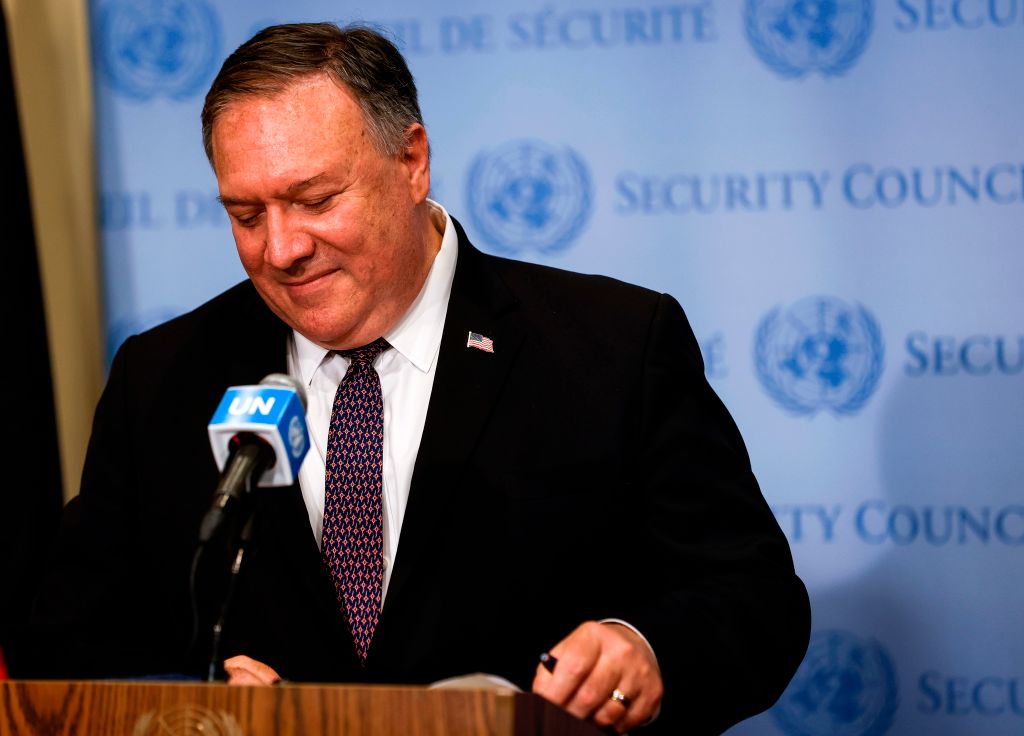Washington’s perplexing attempt to legitimise its latest round of Iran sanctions
Posted By Connor Dilleen on September 25, 2020 @ 06:00

Washington has delivered on its threat to implement a new round of economic and arms-control sanctions [1] against Iran. On 21 September, the White House issued an executive order targeting 27 entities and individuals involved in Iran’s nuclear and ballistic-missile programs and conventional-arms-related activities.
The package of sanctions was ostensibly delivered under the ‘snapback’ mechanism of UN Security Council resolution 2231 [2], which enables parties to the 2015 Iran nuclear deal, the Joint Comprehensive Plan of Action, to seek reimposition of the multilateral sanctions against Iran that were lifted as part of the agreement.
Washington’s approach raises a number of questions. Is it attempting to legitimise its latest actions against Iran under international law, albeit in an inept and heavy-handed way? Or is the idea to demonstrate an ‘America first’ repudiation of multilateralism and international law, as part of an anti-Iran strategy that will reach fruition just before the US election in November?
Washington is isolated in its view that it has the legal basis for triggering the sanctions snapback mechanism. Thirteen of the 15 members of the Security Council disagreed [3] with that position during a meeting in late August, noting that because the US is no longer a participant in the JCPOA, it doesn’t have the right to invoke [4] the snapback mechanism.
As stated [5] categorically by the three European parties to the agreement (France, Germany and the United Kingdom), the US notification under resolution 2231 is ‘incapable of having legal effect … [and] any decisions and actions which would be taken based on this procedure or on its possible outcome would also be incapable of having any legal effect’.
Since its withdrawal from the agreement in May 2018, Washington has already enacted punitive and far-ranging economic and trade-related sanctions against Iran without bothering to cloak them in a veil of international legal legitimacy.
And, as evidenced by the US’s seizure [6] of the cargo of four tankers carrying Iranian oil destined for Venezuela in August—an event categorised [7] in some quarters as an act of state-sponsored piracy—Washington is clearly prepared to interdict Iranian exports without the legitimacy of international law.
Given its willingness to act alone, the fact that the US has sought to legitimise its latest round of sanctions under the terms of the JCPOA is perplexing. Washington’s decision to proceed down this path will have far-reaching consequences for the US’s core security interests and for the integrity of the international non-proliferation regime and the operation of international law.
As noted by the Arms Control Association [8], the White House’s attempt to trigger a snapback will likely prove catastrophically counterproductive for a number of reasons: it would undermine the utility of sanctions as a tool of statecraft; it could instigate a new nuclear crisis with Iran and potentially trigger a new round of global nuclear proliferation; and it fundamentally undermines key US alliances at a critical time.
In late August, US Secretary of State Mike Pompeo responded [9] to the refusal by France, Germany and the UK to support Washington’s efforts to reimpose sanctions by declaring that they ‘chose to side with the ayatollahs’.
And it is in this context that a tension emerges at the centre of the US’s ‘maximum pressure [10]’ strategy against Iran that makes it difficult to decipher the detail of the plan.
There’s a widely held view that US President Donald Trump’s insistence on implementing these sanctions is part of a broader ‘scorched earth’ campaign [11] aimed at definitively killing off any prospect that a future Biden administration could resuscitate the JCPOA. But that observation goes only part of the way to explaining the current US approach to Iran.
What is also likely is that the US’s latest move is intended to achieve two things: provoke Tehran into a response that would justify further punitive measures, possibly including military action to resolve the question of Iran’s nuclear ambitions once and for all; and provide Washington with a veneer of international legal justification for any future action, at least to a domestic audience.
As noted by Iran expert Trita Parsi [12], writing in Responsible Statecraft, there are growing indications that Washington is ‘preparing the ground for an October Surprise—a confrontation with Iran that will be cast as both defensive and lawful’.
If this is the case, the Trump administration may be playing to its electoral base rather than trying to build any international legitimacy for its Iran actions. Squaring off against multilateral regimes, long-standing alliances and strategic competitors is all part of the show.
And, intriguingly, Washington’s latest push comes at a time when Tehran appears to have breathed life back into the nuclear agreement, by finally relenting and allowing the International Atomic Energy Agency to undertake inspections [13], under the additional protocol, of two undeclared locations relevant to Iran’s historical weapons program. Tehran has also continued to cooperate [13] with the IAEA on implementing the most pervasive safeguard-monitoring and -verification regime currently in force.
Given this context, should Washington be positioning itself for an ‘October Surprise’, it will find its credibility and legitimacy on the international stage even further diminished, regardless of who wins in November.
Article printed from The Strategist: https://www.aspistrategist.org.au
URL to article: https://www.aspistrategist.org.au/washingtons-perplexing-attempt-to-legitimise-its-latest-round-of-iran-sanctions/
URLs in this post:
[1] new round of economic and arms-control sanctions: https://www.whitehouse.gov/briefings-statements/statement-president-regarding-new-restrictions-irans-nuclear-ballistic-missile-conventional-weapons-pursuits/
[2] resolution 2231: https://www.undocs.org/S/RES/2231(2015)
[3] disagreed: https://www.reuters.com/article/us-usa-iran-un-idUSKBN25H1Q5
[4] doesn’t have the right to invoke: https://foreignpolicy.com/2020/08/25/trump-pompeo-iran-snapback-sanctions-jcpoa/
[5] stated: https://www.diplomatie.gouv.fr/en/country-files/iran/news/article/iran-jcpoa-joint-statement-by-the-foreign-ministers-of-france-germany-and-the
[6] seizure: https://www.justice.gov/opa/pr/largest-us-seizure-iranian-fuel-four-tankers
[7] categorised: https://www.bloomberg.com/opinion/articles/2020-08-16/the-u-s-brings-state-sponsored-piracy-into-the-21st-century
[8] noted by the Arms Control Association: https://www.armscontrol.org/blog/2020-08-17/dangerous-consequences-trumps-plan-snapback-un-sanctions-iran
[9] responded: https://www.bbc.com/news/world-middle-east-53847650
[10] maximum pressure: https://www.politico.com/news/2020/09/19/trump-iran-maximum-pressure-418225
[11] ‘scorched earth’ campaign: https://responsiblestatecraft.org/2020/09/20/trumps-scorched-earth-doctrine/
[12] noted by Iran expert Trita Parsi: https://responsiblestatecraft.org/2020/09/16/is-mike-pompeo-preparing-an-october-surprise/
[13] allowing the International Atomic Energy Agency to undertake inspections: https://isis-online.org/uploads/iaea-reports/documents/IAEA_September_2020_Iran_NPT_Safeguards_Report.pdf
Click here to print.